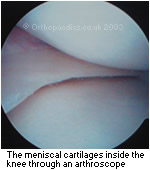


o r t h o p a e d i c s . c o . u k

| +home | |
| +news | |
| +research | |
| +patient infomation | |
| +the clinic | |
| +the surgeon | |
| +sport physiotherapy | |
| +sports advice | |
| +products | |
| +resources | |
| +contact | |
| +maps & directions | |
| +site map |
|
The Bristol Orthopaedic |
Arthroscopy Of The Knee - Introduction
What is Arthroscopy Of The Knee?
 Arthroscopic, telescopic, keyhole or minimally invasive surgery is the technique of performing surgery inside A joint through a telescope without disrupting the surrounding structures. Looking inside the joint with the arthroscope allows the surgeon to look directly at the cartilages, ligaments and the articular surfaces without damaging the joint. The arthroscope is a pencil thin tube containing light fibres and is a means of transmitting a picture of the inside of the joint to a video camera.
Arthroscopic, telescopic, keyhole or minimally invasive surgery is the technique of performing surgery inside A joint through a telescope without disrupting the surrounding structures. Looking inside the joint with the arthroscope allows the surgeon to look directly at the cartilages, ligaments and the articular surfaces without damaging the joint. The arthroscope is a pencil thin tube containing light fibres and is a means of transmitting a picture of the inside of the joint to a video camera.
During arthroscopy extensive examination of the internal knee structures is undertaken. This is more accurate than clinical examination or MRI scanning in terms of detecting and defining the extent of internal problems with the knee. All the structures can be carefully examined including the menisci or meniscal cartilages, the articular surface or articular cartilage, the anterior and posterior cruciate ligaments, the patella, the synovial lining of the knee, plicae or synovial folds, loose or foreign bodies inside the knee. The internal appearances can be helpful in the assessment of the integrity of the collateral ligaments. Commonly arthroscopy is used to assess the extent of arthritis present in a knee before deciding on the correct course of treatment for degenerate or arthritic conditions of the knee.
Arthroscopic surgery is undertaken in most arthroscopic procedures. This is the technique whereby small hand held instruments or mini-powered tools are inserted into the knee through small 5mm incisions to undertake internal arthroscopic or "keyhole" surgery. It is rare that the knee needs to be formally opened other than for joint replacement or arthroplasty procedures. The small tools are used to remove menisci, loose or foreign bodies. It is possible to repair or suture torn menisci through the arthroscope and also the use the arthroscopic procedure to replace or reconstruct the internal cruciate ligaments. The most common procedures undertaken are the removal of menisci, smoothing of articular cartilage flaps, ligamanet reconstruction and removal of synovium or a synovectomy of the knee.
Arthrscopic techniques are equally applicable to ankle, shoulder elbow or wrist surgery as they are to the knee. Arthrscopy of the hip is also possible.
Arthoscopic surgery using miniature skin incisions results in less pain for the patient, quicker healing, faster mobilisation and rehabilitation, day case surgery and a rapid return to work and sport. It is the usual way of treating most internal problems of the knee, ankle, shoulder and elbow.
< BACK to Arthroscopy Of The Knee Index | NEXT: Indications / Contra - indications >
Related Links..
+ How to make an appointment
+ Arthroscopy of the knee - see all links
+ Patient Information Home
+ See the clinic
+ More about Mr Johnson
+ top
© The Bristol Orthopaedic & Sports Injury Clinic 2003. privacy | contact | Powered By Create Medical